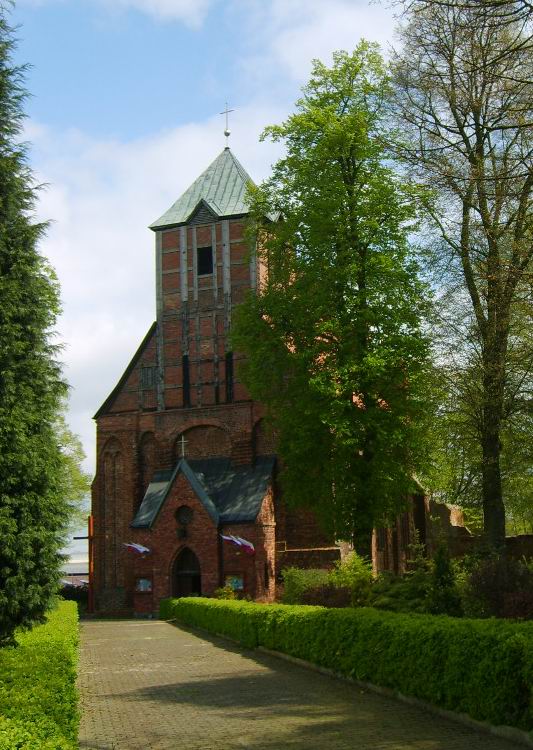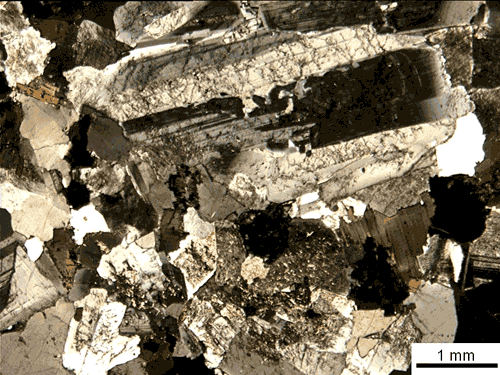|
Przęsocin
Przęsocin (german: Neuendorfhttp://lazowski.szczecin.art.pl/police/fotografie/przesocin-uk.htm Phtotos and history of Policehttp://www.vorfahreninfo.de/Bilder/Region.jpg Old Map of Stettin Area) is a small village south of the town of Police, Poland History Przęsocin, until 1945 known as Neuendorf (as part of Germany), became part of Poland after the end of World War II and changed its name to the Polish Przęsocin. Notable residents * Artur Bahr (1920-1944), officer Tourism *Church from 15th century built with granite Granite () is a coarse-grained ( phaneritic) intrusive igneous rock composed mostly of quartz, alkali feldspar, and plagioclase. It forms from magma with a high content of silica and alkali metal oxides that slowly cools and solidifies under ... * PTTK path (red footpath "Ścieżkami Dzików") in an area of Przęsocin in Wkrzanska Forest Communication *bus lines to Police, Poland: **101 to Police, Poland: Mścięcino, the Old Town and Jasien ... [...More Info...] [...Related Items...] OR: [Wikipedia] [Google] [Baidu] |
Mścięcino
Mścięcino - a district of Police, Poland, town in the Pomerania Region. Communication *Roads: **from the centre of Police to Przęsocin and Szczecin *Main streets in a district: **ul. Asfaltowa **ul. Cisowa *Szczecin - Police - Trzebież Railway *Public transport: ** bus lines 101 (to the Old Town of Police, Przęsocin and a centre of Szczecin), 102 (to the Old Town and the New Town of Police and Szczecin-Skolwin and Szczecin-Gocław), 107 (to the New Town of Police, Przęsocin and a centre of Szczecin Szczecin (, , german: Stettin ; sv, Stettin ; Latin: ''Sedinum'' or ''Stetinum'') is the capital and largest city of the West Pomeranian Voivodeship in northwestern Poland. Located near the Baltic Sea and the German border, it is a major s ...) References {{DEFAULTSORT:Msciecino Police, West Pomeranian Voivodeship ... [...More Info...] [...Related Items...] OR: [Wikipedia] [Google] [Baidu] |
Police, West Pomeranian Voivodeship
Police (; German until 1945: ''Pölitz'') is a town in the West Pomeranian Voivodeship, in northwestern Poland. It is the capital of Police County and one of the biggest towns of the Szczecin agglomeration. The town is situated on the Oder River and its estuary, south of the Szczecin Lagoon and the Bay of Pomerania. The centre of Police is situated about north of the centre of Szczecin. Etymology The name of the town comes from Proto-Slavic ''pole'', which means field. History The settlement was first mentioned in 1243. Pomeranian duke Barnim of Pomerania granted Magdeburg law to the town in 1260.Thomas Gallien, Reno Stutz, Geschichtswerkstatt Rostock, Landesheimatverband Mecklenburg-Vorpommern, ''Landeskundlich-historisches Lexikon Mecklenburg-Vorpommern'', Hinstorff, 2007, p.503 At the end of the 13th century, the town had become a fief of a local dynasty of knights, the Drake family. In 1321, with the death of Otto Drake, the town became a dependency of nearby Stett ... [...More Info...] [...Related Items...] OR: [Wikipedia] [Google] [Baidu] |
Szczecin
Szczecin (, , german: Stettin ; sv, Stettin ; Latin: ''Sedinum'' or ''Stetinum'') is the capital and largest city of the West Pomeranian Voivodeship in northwestern Poland. Located near the Baltic Sea and the German border, it is a major seaport and Poland's seventh-largest city. As of December 2021, the population was 395,513. Szczecin is located on the river Oder, south of the Szczecin Lagoon and the Bay of Pomerania. The city is situated along the southwestern shore of Dąbie Lake, on both sides of the Oder and on several large islands between the western and eastern branches of the river. Szczecin is adjacent to the town of Police and is the urban centre of the Szczecin agglomeration, an extended metropolitan area that includes communities in the German states of Brandenburg and Mecklenburg-Western Pomerania. Szczecin is the administrative and industrial centre of West Pomeranian Voivodeship and is the site of the University of Szczecin, Pomeranian Medical Universi ... [...More Info...] [...Related Items...] OR: [Wikipedia] [Google] [Baidu] |
Police County
__NOTOC__ Police County ( pl, powiat policki, ) is a unit of territorial administration and local government (powiat) in West Pomeranian Voivodeship, north-western Poland, on the Polish-German border. It came into being on January 1, 1999, as a result of the Polish local government reforms passed in 1998. Its administrative seat and largest town is Police, which lies north of the regional capital Szczecin. The only other town in the county is Nowe Warpno, lying north-west of Police. The county covers an area of . As of 2006 its total population is 64,147, out of which the population of Police is 34,284, that of Nowe Warpno is 1,170 and the rural population is 28,693. Neighbouring counties Police County is bordered by the city of Świnoujście (across the Szczecin Lagoon) to the north, and by Goleniów County, the city of Szczecin and Gryfino County to the east. It also borders Germany to the west (districts Vorpommern-Greifswald and Uckermark). There is a common bus transport ... [...More Info...] [...Related Items...] OR: [Wikipedia] [Google] [Baidu] |
Countries Of The World
The following is a list providing an overview of sovereign states around the world with information on their status and recognition of their sovereignty. The 206 listed states can be divided into three categories based on membership within the United Nations System: 193 member states of the United Nations, UN member states, 2 United Nations General Assembly observers#Present non-member observers, UN General Assembly non-member observer states, and 11 other states. The ''sovereignty dispute'' column indicates states having undisputed sovereignty (188 states, of which there are 187 UN member states and 1 UN General Assembly non-member observer state), states having disputed sovereignty (16 states, of which there are 6 UN member states, 1 UN General Assembly non-member observer state, and 9 de facto states), and states having a political status of the Cook Islands and Niue, special political status (2 states, both in associated state, free association with New Zealand). Compi ... [...More Info...] [...Related Items...] OR: [Wikipedia] [Google] [Baidu] |
Artur Bahr
Artur is a cognate to the common male given name Arthur, meaning "bear-like," which is believed to possibly be descended from the Roman surname Artorius or the Celtic bear-goddess Artio or more probably from the Celtic word ''artos'' ("bear"). Other Celtic languages have similar first names, such as Old Irish ''Art, Artúur'', Welsh ''Arth'' - which may also be the source for the modern name. ''Art'' is also a diminutive form of the common name Arthur. In Estonian, and many Romance, Slavic and Germanic languages the name is spelled as Artur. The Finnish versions are Arttu and Artturi. Avestan '/arta and its Vedic equivalent '' '' both derive from Proto-Indo-Iranian ''*ṛtá-'' "truth", which in turn continues Proto-Indo-European ''*'' "properly joined, right, true", from the root ''*''. The word is attested in Old Persian as '. People *Artur Adson (1889–1977), Estonian author *Artur Alliksaar (1923–1966), Estonian poet *Artur Axmann (1913–1996), German Nazi leader *Artur ... [...More Info...] [...Related Items...] OR: [Wikipedia] [Google] [Baidu] |
Szczecin-Bukowo
Bukowo is a municipal neighbourhood of the city of Stettin, Poland situated on the left bank of Oder river, north of the Stettin Old Town and Middle Town, south of the town of Pölitz Pölitz is a municipality in the district of Stormarn, in Schleswig-Holstein, Germany Germany,, officially the Federal Republic of Germany, is a country in Central Europe. It is the second most populous country in Europe after Rus .... As of January 2011 it had a population of 3,720. Before 1945 when Stettin was a part of Germany, the German name of this suburb was ''Stettin-Buchholz''. References Bukowo {{WestPomeranian-geo-stub ... [...More Info...] [...Related Items...] OR: [Wikipedia] [Google] [Baidu] |
Jasienica, Police
Jasienica (german: Jasenitz) is a district of Police, Poland, a town in the Pomerania Region. In the High and Late Middle Ages, the village was the site of Jasenitz Abbey, now in ruins. Gunica River and a kayak-way In Jasienica there is a confluence of the Gunica - a small river used as a kayak-way from Węgornik through Tanowo, Tatynia and Wieńkowo. Gunica flows into Oder in the north part of the town of Police. Jasienica Abbey An Augustinian abbey existed from the 14th century until its dissolution during the Protestant Reformation, when the abbeys of the Duchy of Pomerania were turned into secular domains of the local dukes. The buildings are now in ruins. Each year at the end of August there is ''Augustinian Fair'' (Polish: ''Jarmark Augustiański'') organized in the area of ruins of the abbey, with parade residents of the estate in historical costumes, lectures, artistic performances and stalls with traditional products. Notable residents * Hans Modrow (born 1928), po ... [...More Info...] [...Related Items...] OR: [Wikipedia] [Google] [Baidu] |
Wik Prz Fragm SDC17733
{{disambiguation ...
* Wik peoples, several Australian Aboriginal groups from an extensive zone in Cape York **Wik languages ** ''Wik Peoples v Queensland'' (1996), a landmark ruling that native title can coexist with pastoral leases in Australia * Vik, Iran, a village in Zanjan Province, Iran, also known as Wik * Wik (film), a 2016 Peruvian thriller drama film See also * Wick (other) * Wiki * Wikipedia * Wyck (other) Wyck may refer to: *WYCK, a Pennsylvanian AM broadcasting radio station *Wyck, Hampshire, a village in England * Wyck House, a historic house in Philadelphia, Pennsylvania *Wyck (Maastricht), a neighbourhood in Maastricht, Netherlands See also * W ... [...More Info...] [...Related Items...] OR: [Wikipedia] [Google] [Baidu] |
PTTK
''Polskie Towarzystwo Turystyczno-Krajoznawcze'', PTTK (Polish Tourist and Sightseeing Society) is a Polish non-governmental tourist organization with 312 branches across the country. The PTTK is one of the oldest tourist societies in Europe. Its origins stretch back to the foreign Partitions of Poland. In August 1873 a group of tourism enthusiasts including painter and photographer Walery Eljasz Radzikowski from Kraków and physician Tytus Chałubiński founded the Polish cultural Tatra Society (''Polskie Towarzystwo Tatrzańskie'', originally the "Galician" Tatra Society for the Austrian censorship). A parallel Polish Sightseeing Society (''Polskie Towarzystwo Krajoznawcze'') was founded by ethnographer Zygmunt Gloger in 1906. The two organizations merged after World War II in 1950 to form the PTTK. Current Operations The Society aims to promote qualified tourism and sightseeing. Its activities include designing and marking tourist trails as well as cycling, horse and ... [...More Info...] [...Related Items...] OR: [Wikipedia] [Google] [Baidu] |
Granite
Granite () is a coarse-grained (phaneritic) intrusive igneous rock composed mostly of quartz, alkali feldspar, and plagioclase. It forms from magma with a high content of silica and alkali metal oxides that slowly cools and solidifies underground. It is common in the continental crust of Earth, where it is found in igneous intrusions. These range in size from dikes only a few centimeters across to batholiths exposed over hundreds of square kilometers. Granite is typical of a larger family of ''granitic rocks'', or ''granitoids'', that are composed mostly of coarse-grained quartz and feldspars in varying proportions. These rocks are classified by the relative percentages of quartz, alkali feldspar, and plagioclase (the QAPF classification), with true granite representing granitic rocks rich in quartz and alkali feldspar. Most granitic rocks also contain mica or amphibole minerals, though a few (known as leucogranites) contain almost no dark minerals. Granite is nearly alway ... [...More Info...] [...Related Items...] OR: [Wikipedia] [Google] [Baidu] |




